|
|
The Test Manager's Vade Mecum Testers and test managers who come equipped with their own practices and tools can save time and effort and get a head start on their projects. In this column, test manager and consultant Fiona Charles describes the "go with me" collection she has built over many years and projects to help leverage her varied experience and provide a quick start on new deliverables.
|
|
|
|
Write Now Software professionals excel at writing code, test plans, and other types of technically oriented documents. However, many of them struggle when it comes to writing of a non-technical nature. Naomi Karten offers tips for strengthening your ability to write articulately and compellingly.
|
|
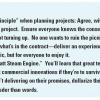 |
Going on a Picnic with James Watt What if you had a picnic and no one brought potato salad? Find out what picnic planning and steam engines have to do with project success and not just satisfying your customers but delighting them.
|
|
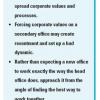 |
Communicate, Don't Assimilate Opening an offshore office can be a tricky situation. Learn how to spread corporate values and processes to your new team members by working together instead of forcing them to adopt your way of thinking.
|
|
 |
The Art of Persuading Management You can't get your manager to give you what you want if he won't listen to you. Naomi suggests some strategies-including being methodical, gathering data, properly timing your requests, and practicing what you plan to say-that can help you make your case to the powers that be.
|
|
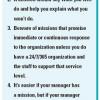 |
Make Your Mission Possible Defining the work that belongs in your group and the work that doesn't belong can be challenging. A strong mission statement can help you defend your stance on what work you will and will not do, while ensuring you still provide the work your organization values.
|
|
|
|
Testing on the Toilet: Revolutionizing Developer Testing at Google You work in an organization with incredibly smart and diligent software engineers. Deadlines are tight and everyone is busy. But when developers outnumber testers by ten to one and the code base is growing exponentially, how do you continue to produce a quality product on time? Google addressed these problems by creating the Testing Grouplet—a group of volunteer engineers who dedicate their spare time to testing evangelism. They tried various ideas for reaching their audience. Weekly beer bashes were fun but too inefficient. New-engineer orientation classes, Tech Talks by industry luminaries, and yearly “Fixit” days became successful and continue to this day. But no idea caught the attention of engineers like Testing on the Toilet. This weekly flyer, posted in every Google bathroom, has sparked discussions, controversy, jokes, and parodies.
|
Bharat Mediratta and Antoine Picard, Google, Inc.
|
|
|
STARWEST 2007: The Nine Forgettings People forget things. Simple things like keys and passwords and the names of friends long ago. People forget more important things like passports and anniversaries and backing up data. But Lee Copeland is concerned with things that the testing community is forgetting—forgetting our beginnings, the grandfathers of formal testing and the contributions they made; forgetting organizational context, the reason we exist and where we fit in our company; forgetting to grow, to learn and practice the latest testing techniques; and forgetting process context, the reason that a process was first created but which may no longer exist. Join Lee for an explanation of the nine forgettings, the negative effects of each, and how we can use them to improve our testing, our organization, and ourselves.
|
Lee Copeland, Software Quality Engineering
|
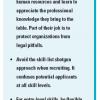 |
The Full Meal Deal A good working relationship with your human resources department can help you simplify your recruitment process. Learn to work together to find the candidates who are best suited for the position rather than relying on the "skill-list shotgun."
|
|
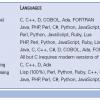 |
Tools for Our Time Software development has really changed over the years, and programming languages have evolved along with it. Learn more about D, one of today's more interesting languages; it's a high-level, type-safe language with the efficiency of C++ and the convenience of Java.
|
|

